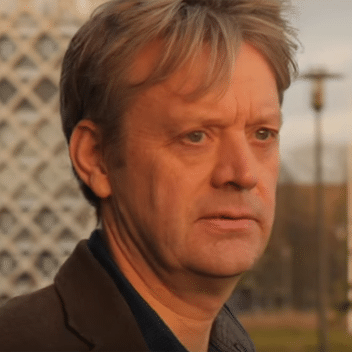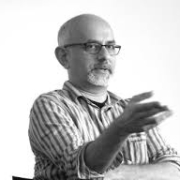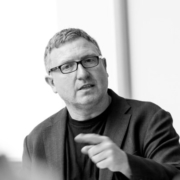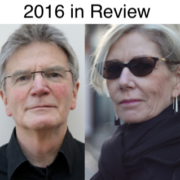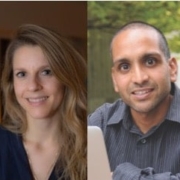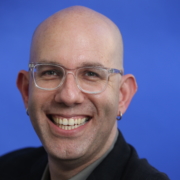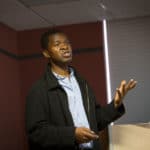What’s the connection between education and climate change? My guest today, Arjen Wals, takes a critical take on sustainability yet offers a hopeful outlook.
In our conversation, Arjen details a few examples of school-level practices that could be seen as working towards a sustainable future while also critiques educational competition and the hidden curriculum of commodification.
He ultimately calls for more dissonance in education systems as a way to learn new forms of sustainability to combat climate change.
Arjen Wals is the UNESCO Chair of Social Learning and Sustainable Development and Professor of Transformative Learning for Socio-Ecological Sustainability at Wageningen University in The Netherlands.
I spoke with Prof. Wals at the 2018 Global Education Meeting, which was a high-level forum held in Brussels in early December that reviewed the progress towards the Sustainable Development Goals.
Citation: Wals, Arjen, interview with Will Brehm, FreshEd, 144, podcast audio, January 14, 2019. https://www.freshedpodcast.com/arjenwals/
Transcript, translation, and resources:
Will Brehm 1:32
Arjen Wals, welcome to FreshEd.
Arjen Wals 1:44
Pleasure to be here.
Will Brehm 1:45
I have just watched you and listened to you give a lecture at the global education meeting here in Brussels. We’re sitting here in Brussels and I wanted to just ask and begin our conversation by asking how climate change is included in the Sustainable Development Goals.
Arjen Wals 2:02
Well, it’s one of the 17 goals and its number 13, I believe. And I think it’s framed as climate action. So, it is seen as a critical sustainability issue, maybe one of the most important ones although the tricky thing about the Sustainable Development Goals is that they they could become competition between them. You know, so there’s life below water, there’s life on land, there is gender equality, there is no poverty, there is lots of these goals that are all important and critical. And I think in comparison to the Millennium Development Goals, which we’re preceding the Sustainable Development Goals, they’re more concrete and they’re not just focusing on the global South they’re as much focusing on the global North, which I think is important. So, climate action is seen as the most -or one of the most I should say- important challenges of the coming 20, 30, 40 years. And, so it’s part of the agenda 2030 that the United Nations has formulated.
Will Brehm 3:13
So, okay, so developed and developing countries that are part of these global goals, Sustainable Development Goals, they’ve pledged to achieve target 13, or goal 13. What are the targets?
Arjen Wals 3:27
Well, the targets are, there are many indicators for these. There are like 169 or so indicators and a lot of people are preoccupied with not just coming up with indicators but also finding ways to measure whether we are achieving them, and they’re used to compare and rank countries in terms of how successful they are in achieving them. So, you know there’s the COP, [Conference] of Parties on climate change and different meetings and the Paris one is probably the one that is referred to the most where we must slow down global warming to two degrees Celsius, preferably 1.5 degrees Celsius. So, if you ask me, so that is one of the aims of course, to reduce global warming. But I’m not an expert on the targets, and in fact, I would argue that there can be a trap for focusing too much on on indicators and ignoring the maybe the values and the engagement of citizens in these types of issues.
Will Brehm 4:33
So, the larger issue of climate change, and its connection to education, how do you see that?
Arjen Wals 4:38
Well, I think we need to ask a serious question. And that is, what is our education strengthening in society? And what is it maybe silencing or weakening? So, when we talk about sustainable development, we need to ask the question, what is it that we are sustaining through our education? And what is it that we are maybe what we need to disrupt through our education. So, sustainability is as much about sustaining things that are healthy as it is to disrupt things that are unhealthy. So, I believe in education, we need to see, is education there to develop human beings, to serve people and planet, to learn to live within ecological boundaries in a good and fair and equitable way so that everybody cannot just survive but thrive? Does it create possibilities for that? Or is education, has it become an extension of the economy? Is it just preparing people to… and I say, “just” because I think that’s not the whole focus of education but is it at the moment, not just preparing people for a lifelong working? Nobody questions that education should develop competencies that make them entrepreneurial, that make them critical, that make them creative, that make them adaptive, that make them empowered and these are all positive outcomes of education. But we also need to ask, what do people do with those capacities and qualities? Is it there to be competitive, to be successful as an individual, to profile yourself in a very competitive world and to excel and to take care of yourself, maybe of your family? So, the question of values, what kinds of values is our education strengthening? Is it the value of solidarity of community, of care of thinking about future generations about connecting with other species? Or is our education strengthening values like individualism, consumerism, competition, which are kind of neoliberal values that are in a competitive, capitalistic economy, very useful values, but they’re not helping us live more lightly on the earth. And they’re not helping us considering other generations and considering the future of the earth. So, the main challenge is -at the moment- how can we reorient education towards people and planet? And that, I think is the challenge to educators today.
Will Brehm 7:22
And since it’s been three years since the Sustainable Development Goals have been adopted, how would you assess the state of sustainable education, education for sustainable development? is it doing this teaching and educating a particular value set that is about care and community rather than a value set of individualism and competition? What’s your assessment of the current state?
Arjen Wals 7:48
Well, I think, you know, of course, every country is different in this respect, and the Sustainable Development Goals resonate better in some countries than in others. And, to me, sometimes a top down UN based approach can work well in countries where education policy is influenced by those calls, and where there is a mechanism for adapting to curricula to these kinds of goals. But if those mechanisms are not there, or if sustainable development doesn’t resonate with people, then they won’t have a lot of traction. So, you see, it’s a mixed bag in that sense. If I look at the Netherlands, for instance, I see that the SDGs are inspiring companies, but also schools to rethink the curriculum and not just a curriculum, to rethink the way teaching and learning is organized. And maybe I’m too optimistic but I do see Eco-Schools -the Eco-Schools network, which is a worldwide network of schools trying to engage with sustainability and environmental issues in a holistic way- they are really trying to get a more localized curriculum that is not driven so much by disciplinary questions from the different subject areas but it’s driven by the existential question that people are challenged by in their everyday lives. It’s really driven by local community issues whether this is about trying to switch from fossil fuels to alternative energy sources to make communities less dependent on fossil fuels or whether it’s towards localized food systems, having healthier food in the canteens, having edible school gardens, or whether it is working closely with local entrepreneurs and teaching skills about how to fix bikes. For instance, a lot of young people in the Netherlands, they don’t know how to fix their bikes anymore, which we, when we grew up, it was part of our education, usually taught by our parents would teach how to fix your flat tire, or to repair your chain, or to put some oil on, all these things a lot of people learned when they were younger. Young people today, don’t know how to do that anymore so they can easily have others do it or their parents or they actually have their bike repaired by the local bike store. But rather than having that, you can invite the local bike store to come to the school and do workshops on how to repair your bike, or to work with local restaurants in creating meals out of the vegetables grown in the school garden and having a community meal where you invite different people in the community also those who are usually not invited to make it more inclusive and to connect the school with the community. This kind of living curriculum around these types of issues where sustainability comes in naturally, you may not even need that word sustainable. We’re talking about good education that is relevant, that is responsive, that is responsible, it is re-imaginative in that it invites people to think about alternatives about the future. It’s creative in envisioning alternative futures. And then teachers have the chance: How do I link biology to this? How do I link mathematics to this? How do I link language and language arts to this, so it’s not driven by the subjects, but the subjects still matter in this type of learning?
Will Brehm 11:19
It all sounds very excellent and I’m sure there are individual examples around the world where this can be found inside schools. But I wonder, will that be enough to counter the sort of dire warning that the intergovernmental climate panel report has come out and said that, you know, in 2040 things are going to be very different unless we make drastic changes. And this, you know, used to be hundreds of years away, now, it’s in a couple of decades. So, you know, I just wonder if, you know, the schools, the education for sustainable development inside schools is certainly needed. But it almost seems like the focus needs to be on educating adults who are the ones that are contributing so vastly to further climate change.
Arjen Wals 12:08
I think it’s important to acknowledge that, you know, that education cannot fix everything, and it would be wrong to dump all society’s ills on our schools. That would be overwhelming and unfair. So, I don’t, we must recognize there’s a whole basket of tools and instruments available to make society’s change varying from legislation, laws, financial incentive, subsidies, technologies. Education is one important component of this, but a much deeper component, you know, in some ways you can compare education with climate change: It’s a very slow process, but it has huge impact, and this is true for education too. The kind of values that we embed in our education have a huge impact on the kind of world that we are creating. So, if you can develop alternative values, values that I was just talking about, if you can bring in those values, not as a result of some kind of indoctrination, where we start programming children to act in a certain way, which I incidentally, which I think our education is doing at the moment. Sometimes people say, well, it’s very normative and, and sustainability that’s pushing a certain agenda. And I say, yes, it is pushing a certain agenda, it’s the agenda of the earth, it’s the agenda of surviving, it’s the agenda of caring for each other, it’s the agenda of caring for future generations, other species, that is an agenda, that is normative. And if you disagree with that, if your belief is you should take only care of yourself, and everybody for him or herself and to future generations, they’ll have their issues. My parents’ generations they had the cold war to deal with and they dealt with it, my generation has now climate change, and my children will probably have that too and future generations they’ll have something else to take care of it themselves. So that’s, to me, kind of me, me, me kind of attitude. And there are people who believe in that, and they will not, you know, they won’t think much of sustainability, I think, but if you think that we have a responsibility, a moral responsibility for the earth for future generations, then you need to ask the question whether our education can -and it’s a slow, deep learning process- can start embracing those kinds of values, and recognizing that the current values that are embedded in education, and we often don’t realize it’s the hidden curriculum of consumerism that is very strong, it’s the hidden curriculum of exclusion, and privilege and entitlements that is very strong in many parts of the world. And then there are those living in the slums of India with hardly any education, but they know a lot because they have to survive under tough conditions and there are very low ecological footprint, not by choice but by force, they’ve learned to live with a very low ecological footprint, which, you know, we could say, is that acceptable or not? As David Orr says, the people who have the biggest ecological footprints are the ones who have master’s degrees, bachelor’s degrees and PhDs. The more education we have in our current system doesn’t mean that we take wiser decisions. And there’s a lot of hypocrisy in this world too, where we talk about it a lot, and then we go to our next meeting, talk about it some more, the gap between thinking and doing is a problem. And I think, to live in accordance to our values or to develop new values into just live in accordance to those values is, is quite challenging.
Will Brehm 15:52
You mentioned the hidden curriculum of consumerism, and it seems that you’re actually getting at the issue of the economic system in which we live, where growth is valued, you know, on top of everything, and we measure the GDP of countries to see how well we’re doing. And we think that to get out of poverty, one needs to have a certain level of income to satisfy his or her wants and desires. And of course, that system of capitalism uses and is based on what Karl Marx called the free gifts of nature, you extract all sorts of resources to turn them into commodities to be bought and sold, and you measure growth each year as success as long as it’s getting higher, you won’t go into recession, for instance. And it seems contradictory because the Sustainable Development Goals have SDG number eight is about economic growth and so it just, it seems to be that that value of understanding the hidden curriculum of consumerism is very difficult for people to get their head around to see how the very process of buying more things in the world and having capitalism as sort of the assumed normal way of life or economy is actually contributing to the climate changing drastically that we also say we want to solve. So, to me, it just seems very contradictory.
Arjen Wals 17:20
There is definitely this growth fetishism, this addiction to growth and expansion that, you know, has been challenged already in ’72, I think the Club of Rome limits to growth and it is not a popular message in the world of conventional business and I say conventional business because there are new business models arising that are much more about the dynamic equilibrium where there are times of growth and times of contraction and where they talk about sustainable growth and they talk about sustainable contraction doing more with less and which is equally important but you’re right I mean that SDG 8 has, I think it’s decent work and economic growth and you have to be critical about that you know. The SDGs are in some ways also problematic: No poverty, everybody agrees. No extreme wealth, you know, you probably get a little opposition but that may be more effective in reducing poverty, if you would have that as a goal. But it’s not. The growth question by no decent work and, and a circular economy where we actually have the cradle-to-cradle where there’s zero waste and where we’re not maximizing profit but maximizing meaning. Now that would be interesting and that would really lead us away from trying to optimize system that in its core, I think, is unsustainable, it’s driven by growth and expansion and extraction as you were mentioning. To transition with a system that is based on different principles and values, that is much more about equity, equilibrium, living within planetary boundaries, more about community building and getting enjoyment in life, not by being fixed to screen or having being detached from place and community but connected to electronics and gimmicks and fast-moving things where we can no longer really think and just be bored on the couch. I think every child has the right to be bored on the couch to just have deep thoughts or to just look out of a window on the train and to see the landscape fly by. Who’s doing that nowadays, hardly anyone, everybody’s on their devices, continuously distracted and when they’re not on their devices, thinking about what didn’t I check, what did I miss? So, this is a real problem, we need to slow down, we need to have a sense of community, sense of place. If you do not care about people and planet, then who will take care of people and the planet in the end? This is a risk, so I think the SDGs themselves, we need to also re-think them. Even the notion of sustainable development. You could say, well, do we need to sustain development, maybe development is problem, continuous development. So, we should start critiquing the notion of continuous development. And I think there’s a lots of communities or groups in say, Latin America, you have the “buen vivir” movement that is really questioning this notion of continuous development and they’re thinking about not objectifying the world and seeing things as commodities that we can kind of trade and extract but having a more relational ontology, and being with the world connecting with the things and species around us in a more meaningful way. This seems far away from where we are right now in this room in Brussels, with technology around us somewhere in a basement. But that type of world, if we can recreate that through tiny forests in cities, for instance, there’s a whole movement or through urban agriculture or as movements towards veganism, for instance, people wanting to eat less meat, people beginning to get a little bit allergic to big companies, taking over all the cookies that we accept every day, where we give away who we are, and our futures are being predetermined, in a way by accepting these cookies. That is a scary future, I think, although some people get really excited about that future. But that’s not my world that I would like to live in and I think education should also make people aware of this hidden curriculum of consumerism, the hidden curriculum of individualism that is pushing us I think, in the end towards extinction and cannot optimize this current system. I think we need to transition away from it and it’s no longer about doing the things we do but only better, it’s about doing better things altogether.
Will Brehm 21:56
It almost seems like what you’re saying is that UNESCO and the Sustainable Development Goals they themselves need to learn. They themselves need to be educated in a completely new way to think about climate change and sustainability.
Arjen Wals 22:11
And I think that is happening also in UNESCO. You see, the language is shifting a little bit, if you look at the global education monitor reports, and the one that I contributed to in 2016, it’s education for people and planet, creating sustainable futures for all. There, you see some critique of this idea of more education will lead, will always be good, it will lead to economic growth, which is always good. There’s now questions about well, it’s not any education that’s good. And economic growth is not always good, it could be problematic. And alternative, indigenous views are important, and we need to rethink the economy. There is a critical voice arising and it’s not just about adapting to change all the time, we hear this a lot adaptive capacity building. We need to also start thinking about disruptive capacity building. And with that, I mean, we need to sometimes go against the grain. And I’m not saying that we need to, you know, it’s not about civil disobedience, necessarily. It’s about asking tough questions and making ordinary, less ordinary. It’s about you know, there’s some places in the US even where, you know, climate change is not really entering the classrooms, you’re not supposed to talk about. So, disruptive capacity, is that child asking the teacher raising his hand saying, but how about climate change? That is an act of disruption, where conversations come in. And I think that’s very important that we continue to have the space to also ask difficult questions. To disturb maybe the routines and systems and structures that make living unsustainable lifestyles easy and living sustainable lifestyles hard.
Will Brehm 23:55
I think that’s happening now in Australia, the students are protesting, saying, we want to talk more about climate change. We want climate change in our curriculum but it’s the government that sort of saying no and resisting. And so, in a way, what I read from that is that it’s actually the students who can -through disruption or civil disobedience, whatever it is, through protest- they can actually force education on to the adults who are the ones that are stuck in place, it seems like.
Arjen Wals 24:25
Of course, there’s an element of generational unfairness, with all this climate change crisis. You know, the people who are youngest today, they have to live in this world the longest, and so in the Netherlands too, there were 38 youth organizations who petitioned the government to do more about sustainability related issues, whether this is Nano plastics and plastification of the world, and toxification of oceans and our bodies, even in soil or air quality, but certainly also climate change and loss of biodiversity. They were saying, we’re not being prepared for the future that’s coming and that’s unfair. Because, you know, you may live 20, 30, 40 more years, and you’ll probably be okay. But we will be stuck in this world and if our schools don’t prepare us and our universities don’t prepare us, and we remain on the trajectory of finding a job, you know, contributing to the economy and buying consumer goods, that’s not going to bring us any future. So, it was the young people, young generations that actually and it led to change, it led to the government saying, okay, we must do better. And there’s a whole kind of curriculum innovation going on right now, where sustainability is one of the along with health and technology, is three pillars of the new curriculum. So, this idea of transgressive learning and disruptive capacity building, I think, is an important part of learning for sustainability.
Will Brehm 26:04
The UN Climate report has estimates that go to 2100 and that may seem like so far away, but really, a child being born today is going to be just about 80 years old in 2100. So, you know, the generation that will be living will be the older generation when those predictions are supposed to come true, you know, are present among us now. We’re living among, you know, potentially the last generation of humans. So, the question I have is in your talk earlier today, you said, you’re a glass half-full kind of guy and I want us to ask, how is that possible, given everything we know about climate change?
Arjen Wals 26:50
Yeah, I have to remain optimistic, in times of climate change. That is a challenge but without optimism, I think things will go faster. So, there’s a need for hope and optimism and that’s why I think it’s dangerous if education just focuses on how serious things are, and how complex things are, and how rigged society is, and that we’re all doomed, because that’s not going to save the Earth, it’s going to just accelerate the whole process. So, I’m looking for, for hope and energy in counter movements, and many of them led by youths. And a lot of schools and universities, lots of social movements too there’s people self-organizing, sharing of goods and services is becoming more popular, the sharing economy, the cradle-to-cradle circular economy, where we have no waste, and it’s no longer about recycling things, it’s really about closing cycles which is new and that is, I think, an important movement. It’s also independent school movements that want to create schools where you can have more autonomy, where teachers are trusted, as humans you have capacity to do something, and they can make good choices so they are not reduced to be focusing on preparing kids for tests and where they’re always held accountable and it’s a culture of accountability, but really culture of learning or reflexivity with that localized curriculum, I was talking about. Off the grid energy movements, localized food movements, these are social-ecological movements that in some parts of the world are creating very desirable neighborhoods and communities where people actually want to move to and they want to live, which can lead to eco-gentrification, which is another issue where it becomes so desirable that only the ones who can afford it can be a part of it. So, we have to be careful that it’s not becoming that. You don’t want to create new bubbles, there’s already plenty of bubbles. And that’s the other thing we need to think you know more about dialogue, and connecting and preaching and bonding, rather than creating these polarized bubbles that don’t interact anymore, of which we see a lot. So, it’s also about utilizing diversity, sustainability and developing social cohesion and sort of people who are different, who are willing to listen and have trust and commitment together, even though you may disagree, because most changes in and that’s education, there’s no change if we are only exposed to those who think the same way as we do. But we do get challenged when we hear and listen to people who have something to say that don’t immediately connect. It’s the dissonance that leads to learning, so we need to create dissonance in a way that just is outside of that comfort zone so that people want to engage and that they’re not, it’s not too far out of their comfort zone because then you will lose them but if it remains within their comfort zone they’re not learning either, so it’s a real challenge to find that sweet spot where people are willing to engage with a new way of thinking and acting
Will Brehm 30:24
Well, I’d like to say that we should have an SDG number 18 and that’s dissonance for all. Arjen Wals, thank you so much for joining FreshEd, it really was a pleasure talking to you.
Arjen Wals 30:35
Pleasure to be here.
Climate Change, Education, and Sustainability

